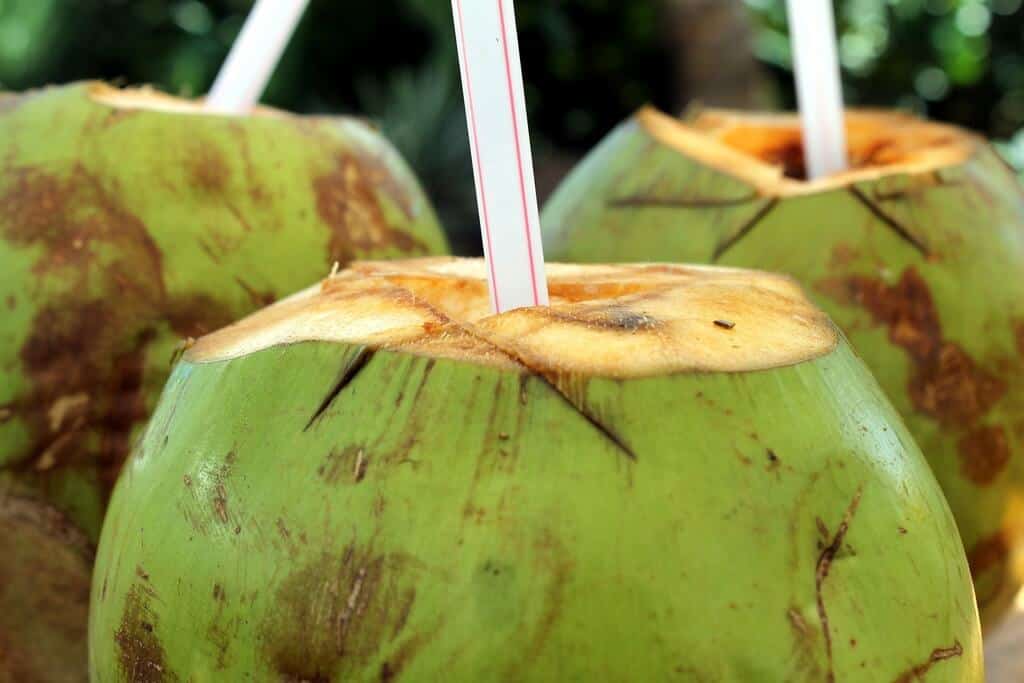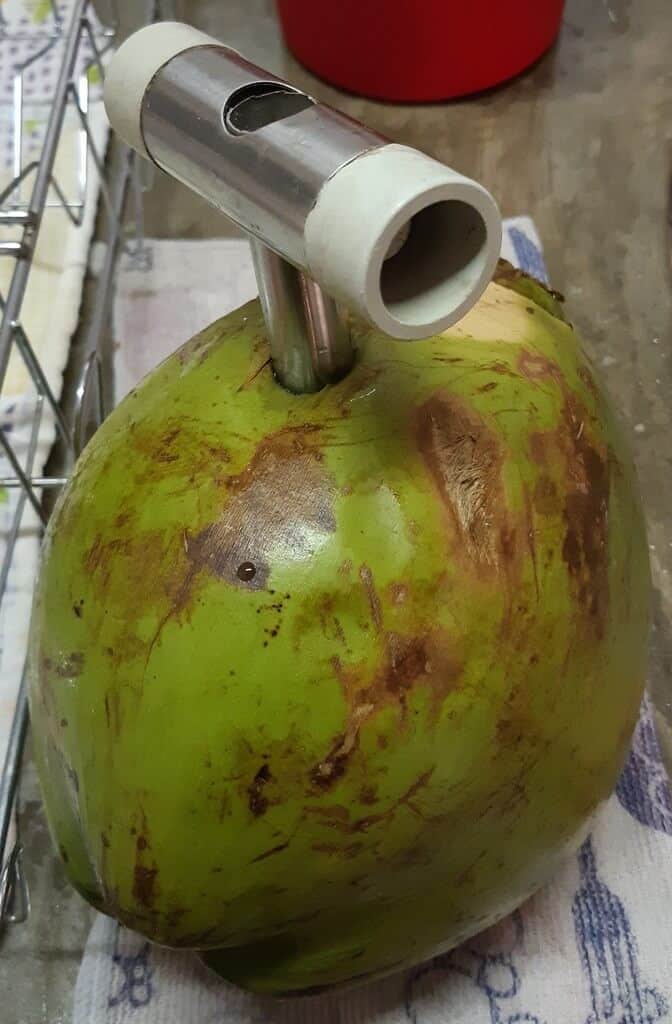Organic coconut water is the refreshing, sweet liquid from the inside of a young, green coconut (Cocos nucifera). Originating in tropical regions such as Rio de Janeiro (Brazil), it’s also very popular in the rest of the world.
Coco water is a healthy alternative to sports drinks and carbonated beverages, with great hydration capabilities and nutritional benefits. It can also be enjoyed creatively by adding it to smoothies or through fermentation into kefir.
Contents
Health Benefits of Coconut Water
- Coconut water’s main health benefit is the potassium content. Apart from lowering the blood pressure, potassium also regulates (a) blood pH, (b) electrolyte balance, (c) heartbeat and (d) muscle contractions. There’s about 600mg potassium per coconut, while your body needs at the most 4700mg per day. A coconut’s nectar contains about 40% more potassium than a medium-sized banana (422mg).
- Secondly, it contains four essential electrolytes that the human body needs to function: magnesium, sodium, phosphate, and calcium. In fact, aside from merely containing these electrolytes, organic coconut water is isotonic. This means it contains these electrolytes in the same concentrations as human blood.
- Aside from electrolytes, coconut water also contains (a) natural sugars, (b) antioxidants (which neutralize free radicals), (c) amino acids (the building blocks of protein) and (d) cytokinins (plant hormones with anti-aging and anti-cancer benefits) (1).
- Another study found that coconut water contains a lot of trace elements (eg. barium, strontium, manganese, chromium and cadmium) that could not be found in the same quantities in groundwater (2). The coconut palm draws water up through its root system, then regulates the concentrations of these elements, regardless of what is available in the ground. This is important since imbalances of these elements are becoming more widespread as soils grow depleted, which has consequences for human health.
- Finally, most municipal tap water is treated with chemicals like chlorine, resulting in a chlorine residue and potentially damaging by-products. This makes the naturally sterile coconut water even more attractive, reducing the synthetic chemical load we put into our bodies. The water gets naturally filtered by the coconut tree.

Organic vs Non-Organic Coconut Water
The Coconut water you find on supermarket shelves is unfortunately very different to fresh organic coconut water. Packing, shipping and pasteurizing to ensure a longer shelf life all harm the fragile components of the water, making it less nutritious. Plus, there’s often sugar and flavoring added. In addition, many coconut water brands are reconstituted from concentrate. This means the original coconut water must first be reduced to a syrup through exposing it to high temperatures. Such temperatures denature the enzymes and damage the nutritional composition of the water. While in fact, coconut water is at it’s healthiest the moment you drill the hole in the coconut.
On the plus side, coconuts are one of the few foods that were found to have negligible pesticide residues in a number of studies (3). However, the recent increase in demand for coconut water may have led to increases in post-harvest treatment of coconuts.
In particular, young coconuts get submerged in a sodium metabisulphite solution (a preservative also used in wine production) (4). This is done for up to three minutes to prevent browning and mold on the trimmed husk. However, the consequences to the coconut water itself are negligible. This is because of the low concentration of sodium-metabisulphite used and the layer of husk protecting the inside of the coconut (5).
Lastly, apart from simply avoiding synthetic chemicals (such as sulfites), organic coconuts also incorporate more sustainable growing practices. This is beneficial towards both the health of the soil and the well-being of the coconut palm trees.
Coconut Water Packaging
The alternative packaging methods such as aluminum cans, tetra packs and plastic bottles, all come with their own pros and cons. Pollution is a problem, thus you should make sure the packaging is recyclable. Furthermore, in terms of health implications, there are downsides to both aluminum and plastic exposure. However, at least with tetra packs, you can check that the lining is BPA free.
The Weigh In
Coconut water has become a popular exercise rehydration alternative to sports drinks. However, it is common knowledge that such sports drinks are often laden with artificial colorants, flavors, and chemicals. A natural alternative can only be a good thing, right?
Although pure water lagged behind, a scientific study (6) found no difference in hydration between coconut water and sports drinks. However, most would still want to avoid the chemical additives and excess sugar of sports drinks, while getting the health benefits of a fresh natural drink.
Thus organic coconut water is clearly the best choice. Yet, there could be further considerations. For example, when you’re a professional or ultra-marathon athlete, you also need to check for adequate sodium intake. To avoid sodium deficiency as a result of strenuous exercise, add some sea salt to your coconut water. And don’t forget to keep on drinking normal water as well.
Can you drink too much Coconut Water?
The hydration benefits depend on the level of your body’s dehydration. Thus if you drink too much, your body simply won’t absorb all the electrolytes available in the water. Either way, most of us are not consuming the recommended 4,700mg of potassium per day. Yet, even with healthy kidneys, there is a small danger of Potassium overdose if you drink more coconut water than the Recommended Daily Allowance. As always, too much of anything is not good for you. Limit your daily coconut water intake to a few servings, to keep a balanced nutrient profile in your diet.
Conclusion
In a nutshell (pun intended), it is clear that the carton of coconut water on the supermarket shelf will never come close to organic coconut water. However, it remains a better choice than say, carbonated soft drinks. But if you’re looking for a refreshing, tasty and re-hydrating drink, even better than sports drinks, then the choice should be pure, organic coconut water. Straight from the tree.

What do you think about Organic Coconut Water? Tried it? Do you prefer it to regular packaged coconut water? Comment below.
Why not give freeze-dried instant coconut water a shot. It’s especially useful to store inside your luggage while traveling. You can find it at I-Herb (get an up-to-date price here).
References
1. Ferreira, M. 2016. Seven Health Benefits of Coconut Water. Retrieved from: https://www.medicalnewstoday.com/articles/318394.php
2. Kalman, D., Feldman, S., Krieger, D., and Bloomer, R. 2012. Comparison of coconut water and a carbohydrate-electrolyte sport drink on measures of hydration and physical performance in exercise-trained men. Journal of the International Society of Sports Nutrition, 9(1). https://jissn.biomedcentral.com/articles/10.1186/1550-2783-9-1
3. Sisson, M. 2012. 7 Foods You don’t need to buy organic. https://www.marksdailyapple.com/7-foods-you-dont-need-to-buy-organic/
4. Tetra Pak – Coconut Handbook. http://coconuthandbook.tetrapak.com/chapter/harvesting-and-post-harvest-management
5. Coconut Research Center. 2011. Ask Doctor Coconut: Is Drinking Fresh Young Coconut Water Dangerous? www.coconutresearchcenter.org/hwnl_8-4.htm
6. Journal of the International Society of Sports Nutrition by Prasad & Raghu, 1994.

